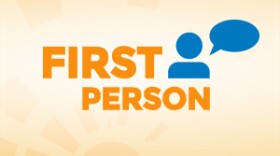Six women per day are diagnosed with breast cancer. If discovered early, it has a high survival rate. For communities of color, there are additional barriers to treatment. The foundation in San Diego says African-American women have a 41% higher mortality rate for breast cancer than white women. As part of -- part of the first-person series, a woman decide -- decided to get a mammogram and now she's battling for her life. My mother and the type of history that African-Americans have, they are not open. That is frustrating. They are not open. Ion the opposite of that. I'm very open. How do you know your information will not help the next person? That is why I feel the need to tell the story. My name is Sheri Hendrix. I have three girls . The first child is 21. I have a 15-year-old and the 10-year-old. They called me on the telephone when I was a work. I think it was the worst I cried. It was so impersonal. How are you going to call someone and tell them something like that? You could at least -- she said -- I'm sorry to tell you this but your positive for breast cancer. I just kept saying, what does that mean? I do not understand what you're saying. I hear her but I do not understand. I could not understand anything she was saying. It was like she was talking in Spanish. I needed to get out of work. I did not want anyone around me. I could not think I broke down crying. I do not understand. What about the kids? What is going to happen with the kids? I didn't even take out an insurance policy. Everything is going through my head. Why wouldn't they call me into the office to tell me something like that and tell me to bring a family member? That was so wrong. That was the worst day ever. The reason I went was because at work, two with the ladies in my department passed away back-to-back. It was with the week. My goodness. These people sit not too far for me. I just started thinking. When was the last time I had been to the doctor. I have insurance. I need to go. I made an appointment to get a regular checkup and physical. Speaking to the doctor, I was like, I am only 40. I haven't gotten a mammogram. Should I get that? He said, do you have a pain? I said no. He said family history? I knew for a fact that my grandma and great-grandmother on my mom's side had it. He was like, your mom or your aunts? Us it No. That is not -- it is up to you. Something told me, I don't know what was. What is the step to get this done? It is in my mind to get it. Let's do it. He said that is fine. I will send the referral. When the family, I was more worried about telling the kids. The way that my personality is, I was like, I have to tell you that I have cancer. The eyes got big and they are looking worried. I said I'm fine. I have to get surgery and I just have to move past it. I talk to them. I talk to them all the time. They are sad. There are sad moments. That is not my personality to be said. I don't understand why people are said. Why are you sad? I am alive. The only thing that makes me sad is my hair is gone. [ laughter ] What is the next step is what do we need to do now to fix it? There is a way to fix it and let's do it. I know for fact, if I did not open my mouth and go, now I know I am stage III. I know that I made the right decision because if I had waited, it could have been worse. You have to take care of yourself. Nobody is going to do it for you. I am looking forward to getting my hair back. A look at myself in the mirror and I feel sad. I know it will grow back. I am glad I opened my mouth and got the mammogram or would have been a worse situation. Do not be afraid.
Last summer Sheri Hendrix, 41, of San Diego decided it was time to get a mammogram.
"The reason I went was because at work, two of the ladies in my department passed away back to back in the same week," said Hendrix. "I just started thinking 'when's the last time I've been to the doctor?' you know I have all this insurance, I need to go."
The American Cancer Society’s guidelines say women with average risk should get a mammogram starting at age 45. But Hendrix said she felt she couldn't wait.
Her grandmother and great grandmother had breast cancer. But because her mother didn’t have it, her doctor told her it wasn’t considered hereditary and she could put off the exam.
Hendrix decided to get a mammogram anyway – and found out she had stage 3 breast cancer.
As part of our First Person series, Hendrix shares the struggles and growth she's experienced since being diagnosed.






